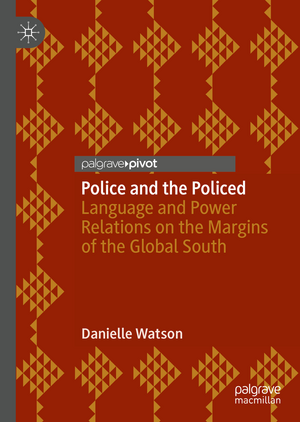Police and the Policed: Language and Power Relations on the Margins of the Global South
Autor Danielle Watsonen Limba Engleză Hardback – 25 oct 2018
Preț: 417.90 lei
Nou
Puncte Express: 627
Preț estimativ în valută:
79.96€ • 83.79$ • 66.11£
79.96€ • 83.79$ • 66.11£
Carte tipărită la comandă
Livrare economică 11-25 aprilie
Preluare comenzi: 021 569.72.76
Specificații
ISBN-13: 9783030008826
ISBN-10: 3030008827
Pagini: 130
Ilustrații: XIII, 138 p. 2 illus.
Dimensiuni: 148 x 210 mm
Greutate: 0.34 kg
Ediția:1st ed. 2019
Editura: Springer International Publishing
Colecția Palgrave Pivot
Locul publicării:Cham, Switzerland
ISBN-10: 3030008827
Pagini: 130
Ilustrații: XIII, 138 p. 2 illus.
Dimensiuni: 148 x 210 mm
Greutate: 0.34 kg
Ediția:1st ed. 2019
Editura: Springer International Publishing
Colecția Palgrave Pivot
Locul publicării:Cham, Switzerland
Cuprins
1. Introduction.- 2. Policing Marginalized Communities in the Global South – Examining Contextual Realities.- 3. Community Profiles – Initial Thoughts on Positioning the Police and the Policed.- 4. Assigning the Brand – Police Labelling and its Impact on Police/Community Relations.- 5. Branding Babylon – How the Policed see the Police.- 6. Police Typecasting and the Power Dichotomy.- 7. Stigmatizing and Stereotyping the Police: Communicative Realities for the Policed.- 8. Negotiating Labels, Stigmas and Stereotypes – Discussions for the Future of Policing.
Notă biografică
Danielle Watson is the coordinator of the Pacific Policing Programme at the University of the South Pacific, Fiji. She specializes in police/civilian relations on the margins with particular interests in hotspot policing, police recruitment and training, and many other areas specific to policing in developing country contexts.
Textul de pe ultima copertă
This book examines communication between police and residents of a designated crime ‘hotspot’ community in the Global South. It looks at communicative realities within a marginalised community in the twin island republic of Trinidad and Tobago and explores how police and the individuals that they police purposefully assign categories to each other before, during and after interactions. It also examines the relations between the police and the community and how power is manifested through authored or assigned labels, stigmas and stereotypes. Overall, it suggests alternative strategies to address problematic police and community relations and provides another standpoint from which communicative redress between police and residents of marginalized communities in the Global South can be approached.
Caracteristici
Examines how language shapes police-civilian relations in Trinidad and Tobago Offers a multidisciplinary exploration Speaks to those in Sociology, Criminology and Criminal Justice, Political Science and Linguistics
